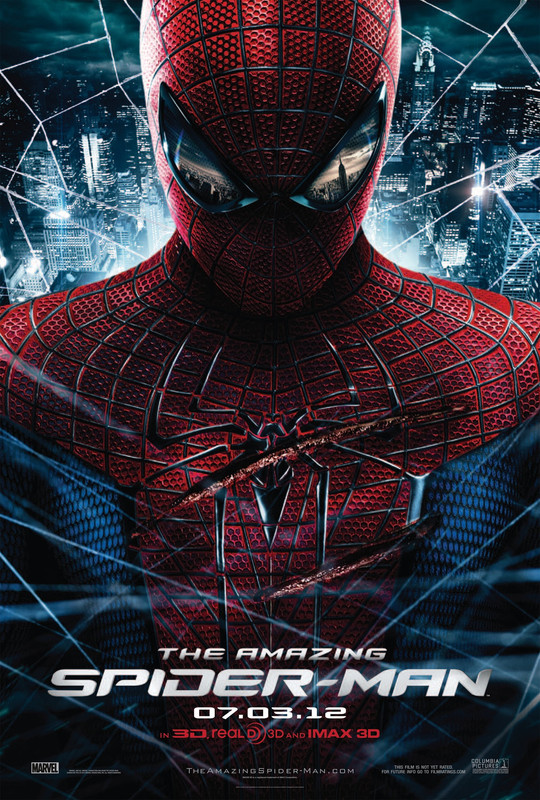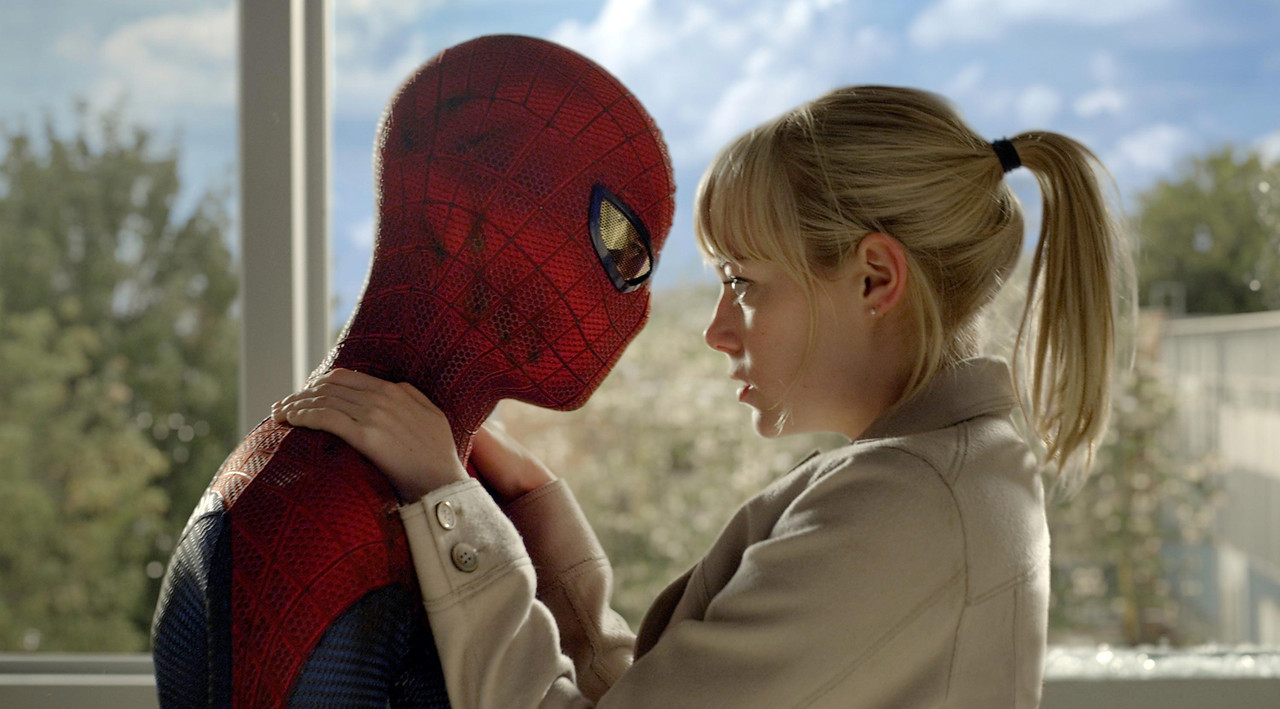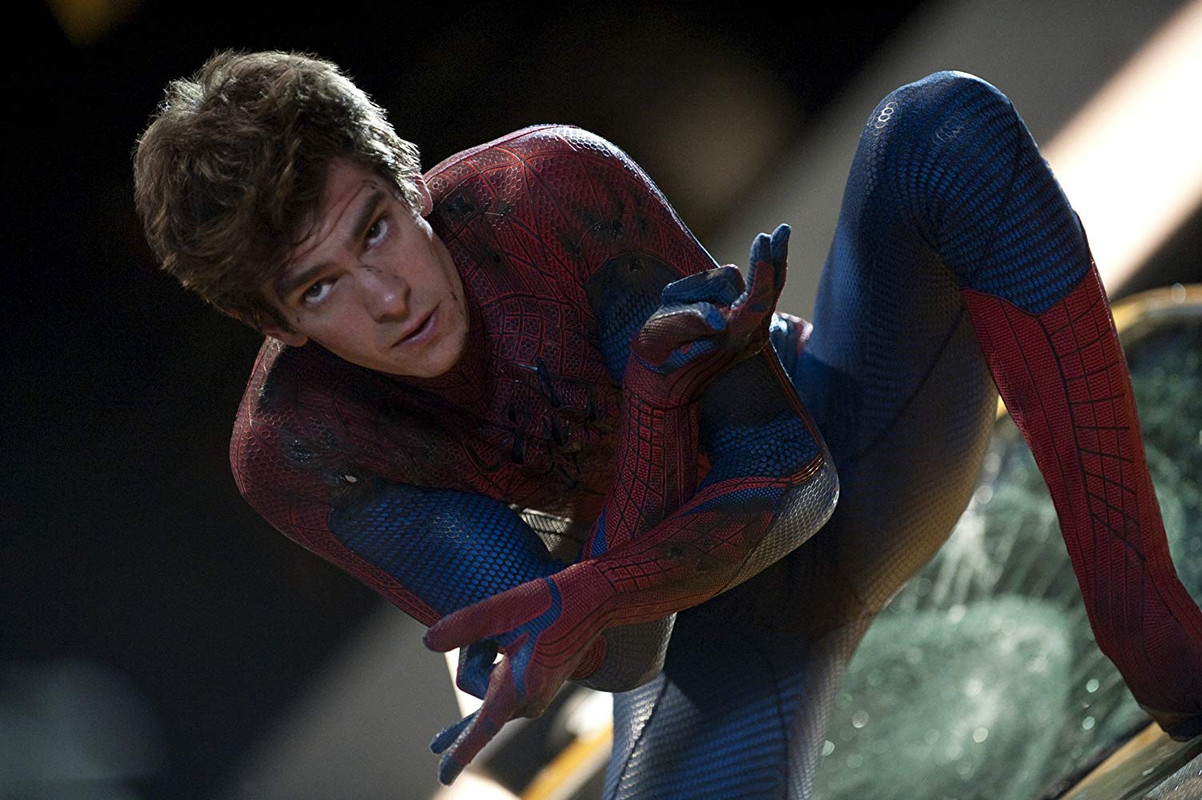Dir: Marc Webb
How does one quantify the 'badness' of a film? The Amazing Spider-Man is not terribly badly made by Hollywood standards, the CGI is competent, as is the acting, and it is unafflicted by the terrible, terrible trends in action choreography that dog so many mainstream action blockbusters. I've seen several films this year that are, objectively speaking, worse than The Amazing Spider-Man (Battleship, you piece of shit, go and stand in the corner), but I haven't seen a film I've hated as much, or had as bad a time at the cinema in a long time as I did while watching Marc Webb's disastrously awful franchise reboot.
I should clarify my bias up front: I grew up with Spider-Man, when I was 5 my birthday cake was decorated like his mask, my Mum knitted me a Spider-Man jumper, and she even wrote a (pretty good) short story, even inventing a villain for Spidey to fight, all for my amusement (thanks Mum). I loved Spidey because he was the superhero who seemed the most real to me, especially when I was a teenager and reading back through the classic Lee/Romita issues of Amazing. Peter was uncool, but not a total outcast, and he was very smart when it came to science, but not so much when it came to relating to people. Behind the mask he grew in confidence; often ready with a one-liner for a villain, but also self-deprecating, and whatever issues he had were all still present. That's how I think of Spidey. I wonder if anyone connected this film has ever read a Spider-Man comic, because what I saw here really doesn't feel anything like the Spidey I grew up with, and not in an 'oh, how refreshing' kind of way.
With all their ups and downs, all their problems, the one thing Sam Raimi's first two Spider-Man films really nailed was the depiction of Peter Parker and Spidey, both felt like they had stepped out of the comic, and there was a real sense of truly seeing my childhood hero come to life. That's all gone with this iteration of the franchise. I don't really recognise Andrew Garfield's Peter Parker, there's a gratuitous nod to him being nerdy and unpopular in a forced series of conflicts with Flash Thompson (no better rendered here than in Raimi's film), but from the self-consciously cool haircut to the skateboard to the studiedly retro camera he's got, Peter just doesn't seem enough of the high school outcast. Despite the camera Peter's photography is another thing that goes largely missing here, the only use of it in the main plot being a lazy device to compromise his secret identity (the Daily Bugle appears in one shot here, and there is no J Jonah Jameson).
The worst thing, though, is that right from the outset here... I just don't like Peter very much. Hollywood, in the wake of Twilight, now seems to believe that 'sullen', 'deep' and 'real' are all euphemisms. Not only is this not true, but employing it here amounts to giving Peter a personality transplant. This Peter is, well, kind of a dick. Here's an example: in both the first Raimi and in this film, Peter arrives home late, and in doing so breaks a promise to his Uncle Ben (here played by a perfectly cast Martin Sheen). In the Raimi this happens because Peter is excited, and loses track of time trying out his new powers. In this film he's at the lab with Dr Connors (Rhys Ifans), and when he gets a call reminding him of the appointment he has he checks it and simply ignores it. In one he's an over-excited kid who forgot something important, in the other, he's just a dick. If this started when Peter got his powers then the cockiness and swagger he has as Spidey might work better (though aside from a few nice moments even the wisecracking Spider-Man falls flat), but as it is the arc is really lacking, and honestly I'm not sure which film the people praising the 'emotional journey' watched, because it sure as hell wasn't the one I saw.
Another weakness in the emotional arc of the film for me is the relationship between Gwen Stacy (Emma Stone) and Peter. Whatever the failings in how she was depicted there was a reason Mary Jane Watson was the girlfriend in Raimi's trilogy; largely that the most interesting thing Gwen Stacy ever did was die. Here the comic book science major is made, ostensibly, Dr Connors' most brilliant intern (not that the film actually uses this attribute, or that it is remotely believable), but the relationship lacks either the sense of history or the depth of feeling that there was in Peter and MJ's relationship in the earlier films. Gwen and Peter start dating, but it never feels all that important, yes, Peter's concerned about her come the final set piece, but without that sense of history to their relationship the stakes feel low. Stone and Garfield do what they can with the material, but Stone is saddled with a thin character, and they have too few scenes together (one, a longer date that was Garfield's favourite scene in the film, was cut, and might well have improved this storyline considerably).
Spider-Man fans have been waiting to see The Lizard on screen for a long time, and it's a real shame, well cast though Rhys Ifans is, that Dylan Baker, who played Curt Connors in Raimi's films, never got to take on the role. The Lizard is reasonably well designed and rendered, but overall the villain is another way in which the film falls down. So much time is given over to setup in this film (Peter doesn't get his spider bite until about 45 minutes in) that you'd think there would be some depth to Connors, but despite good intentions in developing his longing to have his amputated arm restored the motivation is largely thrown out of the window when he becomes Lizard, despite the fact that he is still in possession of all of Connors' mental faculties. It should feel personal between Connors and Peter, but it doesn't (despite the fact they had less of a connection to begin with the personal stakes were much higher with Dr. Octopus in Spider-Man 2), and so that means that the large scale finale - even beyond the fact that several key things seem to have gone missing from it (Hi SWAT lizards... Bye SWAT lizards) - disappoints.
The action is reasonable, but there aren't any really developed set pieces, like the fantastic train sequence in Spider-Man 2, instead there are short beats of action, giving the film a piecemeal feel. Unlike several other directors who have come to the genre from outside, Marc Webb (whose sole previous credit is (500) Days of Summer) never really puts a personal stamp on the fight scenes. They're not as cutty as some recent blockbusters, and the CGI has evolved past the rubbery feel of Raimi's first film, but it still ends up, without the investment, and without any really spectacular choreography, feeling like two piles of pixels hitting each other. Another thing that Webb seems to have been brought in to build on is the backstory between the characters; Peter and Connors, and Connors and Peter's parents, Richard (Campbell Scott, a good piece of casting that serves no purpose) and Mary. The trailers hinted at a big mystery surrounding Peter's parentage, and its connection to his becoming Spider-Man but this, along with many other strands of the story, is unceremoniously dropped, a casualty of a crowded first hour. This is a shame, because it's really the only marked difference between this film and Raimi's, and while I don't like the angsty tone the constant echoes of the previous film only make this one worse.
The tone is all over the place. The film strives for darkness with elements like Peter's vengeance fuelled vendetta as he tries to find Uncle Ben's killer, but it also wants to find the lightness and wit that defines Spider-Man, the two don't mesh at all. This leads to some genuinely terrible moments like the spectacularly awful scene when Peter, on the subway, discovers his powers by accidentally beating up everyone in the carriage, this then carries through into a truly dreadful montage of 'Oh, guess I don't know my own strength' gags that sit completely at odds with the rest of the film. Only the much trailered "You've found my weakness, it's small knives" conversation provides a brief glimpse of the real Spidey, but even that comes in the middle of this misconceived vengeance plot (which is also unceremoniously dropped, as if Webb and Co just lost interest in it). Stan Lee's rather inpired cameo is also a rare moment in which the tone works, though that scene feels very much like it could come from Spider-Man 2.
So many things are thrown away here. For instance the film gives Peter back his mechanical webshooters, but then does very little with them. This was supposed to put the accent back on Peter's intellect, but not only does he steal, rather than invent, the web fluid (see, told you he was a dick), the process of inventing the shooters is only a brief moment in a montage, and there is little use made of the potential pitfalls of them in the action scenes, and none of the process of learning to websling that was such a part of the first film. As for Peter's intellect... it seems to come and go. He's smart enough to pull an equation Dr Connors has been after for fifteen years out of thin air, but dumb enough to remove his mask at every possible opportunity, or to behave like a total dipshit at dinner with Gwen's family. A little consistency would be nice.
The technical aspects of the film are largely fine, but it does drop the ball in one important area: the 3D. There's no ghosting or anything like that, and even the smeary quality of 3D action seems somewhat reduced, but it doesn't add anything - certainly not a single shot struck me as better for the use of the technology - and the darkening of the picture is the worst I've seen in ages. 3D should be made for this movie, with its acrobatic, high off the ground action scenes. Confession time: I'm petrified of heights, so much so that I had to look away at the cinema every time the trailer for Man on Wire was shown. I should have been in serious trouble with my vertigo in this film, but I wasn't affected for a single second, the sense of scale and height just isn't as present for me in 3D, because it's so nakedly fake. By comparison, after countless viewings, the ending of True Lies still makes me feel a bit sick with its 30+ storey high set piece. As I often do, I flipped up my glasses at a few points in the film, just to see how much use was being made of the 3D, and what the colour looked like without the filter. For the most part I do this for a few seconds, but The Amazing Spider-Man makes such limited use of its 3D that I was able to watch whole scenes without the specs, and much more enjoyable it was without them. For one the colours are much more natural, you can see more detail in the frame, and it feels much more like the real world because there isn't this grey cast to everything, but also, for most of the dialogue scenes, all it really does is remove a layering effect. During a conversation between Peter and his Uncle Ben I watched about half the scene with my glasses on, and half with them off. The difference was that with my glasses on Martin Sheen looked like a slightly discoloured cutout. PROGRESS!
The Amazing Spider-Man is, perhaps, objectively, not as terrible a film as I think it is. But my job, as I see it, is to faithfully report and reason out my experience of a film, and I HATED it. Martin Sheen is literally the only thing I liked, and he's in it for about ten minutes total. There are so many little disappointments, from the feeling that the film has been radically cut to James Horner's score, which somehow manages to neglect to have an identifiable Spider-Man theme. As a Spider-Man fan I felt it totally failed to depict, or even to reinvent, the character I love. As a filmgoer I found it dull because I didn't engage with the characters or the relationships, and because the stakes feel really low and I found it alienating because the tone is broken and I didn't like the main character. I also found it outright unpleasant to watch visually, because the studio have shackled their director to a visual gimmick that makes his movie too visually dark and which he clearly has no idea how to use. I HATED this movie, so much that I wanted to walk out, I hope I've done a decent job explaining why.
★☆☆☆☆
★☆☆☆☆




Really lucid review, Sam. I agree with pretty much everything you've said, especially the film's employment of 3D. I've seen the film in 2D and 3D, and the 3D really doesn't add anything at all. I just don't think there's much "immersive" about turning a flat 2D image -- which we've been exposed to by paintings, television, etc. for our whole lives -- into a fake-looking pop-up book fantasy land. And things flying toward the screen only serve to break your engagement with the diegesis and make you remember you're watching a film. It's tantamount to a boom mic falling and hitting Garfield on the head. The 2D experience is much brighter and easier to watch, though no more enjoyable as you have less to distract you from the incredibly derivative, mediocre plot.
ReplyDelete